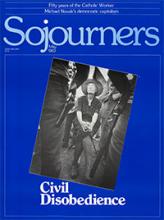Any newspaper on any given day reminds us that violence abounds in the world. The arms race, repression in Central America, homeless people in our own country, all call to mind that violence appears in many forms. Yet the causes, as well as the results, are interrelated. How can we respond to it? How can we strike at the roots of this pervasive evil?
While there are many ways in which we might act, Gandhi, Martin Luther King, Jr., Dorothy Day, and others have taught me through their lives and their words that civil disobedience is an important and at times necessary way to confront power when that power protects injustice. They have also taught me that such a step can be effective in a profound sense, whether or not it "works" in the world's eyes, if it stems from and contributes to a genuine search for truth and justice.
Their witness teaches me that if we want a better world, we must act to build it. They teach, too, that the end is the result of the means. If we would build a society where justice and truth prevail, our efforts must be rooted in these qualities, not in those we reject.
The many manifestations of violence stem from the powerful judging who is to live, and under what circumstances. If we oppose what is violent, we must also reject the greed, deceit, injustice, and judgment on which it is based. Self-sacrifice, honesty, justice, and respect for all people, even if we disagree with them, even if we challenge their actions, must mark our efforts.
Read the Full Article

